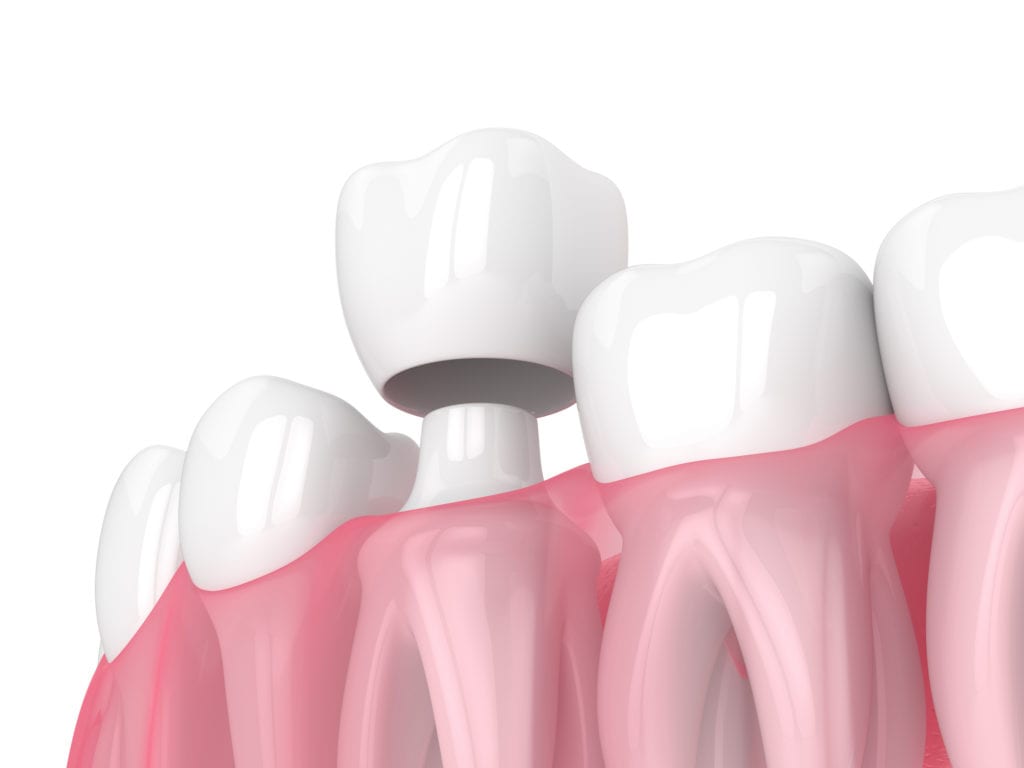A dental crown is a dental restoration that acts as a cap to cover a tooth. We may recommend a dental crown for severe tooth damage and discoloration. Chipped teeth, broken teeth, and cracked teeth can be covered and protected by a dental crown. Our dental professionals provide dental crowns to patients at Waterford Family and Cosmetic Dentistry.


Treatment with Dental Crowns in Leland, NC
Before your dental crown treatment, we will thoroughly examine your teeth, gums, jaw joints. Once we have determined that your teeth and gums are infection-free and healthy enough for treatment, we will prepare the teeth. To prepare the teeth receiving the crowns, we remove a small amount of the natural tooth structure.
Then, we take dental impressions that are sent to a dental laboratory. While your dental crowns are created, we will give you a temporary cap on each treated tooth. When complete, we will ensure that your dental crowns are secure and comfortable.
What Do Dental Crowns Treat?
Dental crowns are a great restoration because they can take care of a wide range of cosmetic and restorative problems. Cosmetically, there are some kinds of staining that don’t respond to traditional professional whitening techniques. The ceramic of a dental crown can be color-matched to any shade of white you’re looking for. If you have teeth that are misshapen or have a defect, a crown completely covers the tooth so that no one can tell!
There are many restorative uses for crowns as well. One of the most common is using a dental crown to stabilize a tooth after a root canal. If your tooth is broken or chipped, it helps to replace the broken part gives you back full usage of your tooth. We also always try to keep the original tooth structure when possible. If your tooth is severely damaged, a dental crown can keep it together and you can avoid the consequences that come with having a missing tooth.
Inlays and Onlays
Inlays and onlays are restorations made of porcelain resin similar to crowns and fillings. An inlay fits between the cusps, or outer edges of a tooth, while an onlay covers one or more of the tooth cusps. Both inlays and onlays are stain-resistant and easy to maintain. They are also great options for patients who do not need to treat their whole tooth but have damage on or within the tooth cusps.
Dental Crown FAQs
Our patients may have further questions about dental crowns, including:
How do I care for dental crowns?
You can take care of your dental crowns as you would your natural teeth. Gently brushing and flossing your crowns helps prevent plaque from impacting your gum health. Directly after receiving your crowns, we recommend that you refrain from eating hard or sticky foods. You can begin to eat these foods about 3 days after treatment.
Is the dental crown procedure painful?
We want to ensure that our patients feel comfortable as possible during treatment, which is why we offer sedation dentistry and local anesthesia. It is normal to experience swelling and sensitivity following treatment. However, these symptoms will subside within 48 to 72 hours of your crown treatment.
What should I do if I have a broken crown?
If you have a broken crown, please contact our office as soon as possible for an appointment. We provide emergency dental care to our patients as soon as possible. We will restore the dental crown with a durable replacement. It is important to have a properly fitting crown as loose or broken crowns can damage the tooth underneath.
How long do dental crowns take to settle?
Initially after your dentist places a crown, you may feel minor discomfort. This typically goes away within 2 to 3 weeks. If discomfort persists, call our office to schedule an appointment.
What should I avoid eating with a crown?
Patients with a crown should avoid eating chewy or sticky foods, crunchy foods, and foods that are extremely hot or cold. All of these may cause sensitivity, discomfort, or even damage.
Can flossing damage crowns?
For the first few days following the placement of your crown, we recommend being extremely careful while flossing. The best way to floss is to slide it out from between your teeth, rather than lifting it up. The lifting motion has potential to damage your crown.
How long does it take your gums to heal after a crown?
The duration of discomfort following the placement of a crown should not exceed two weeks. If you have severe discomfort after a crown operation, or if the pain has not subsided within two weeks, call our office to schedule a check up!
Can you get a cavity under a crown?
There’s a risk of cavities developing below the crown. The durability of ceramic crowns makes them a great choice for preventing further tooth decay or damage. They can also become a breeding ground for bacteria if not handled correctly. If decay develops underneath the crown, your dentist must remove it, clean out the decay, and reapply or replace the crown.
Request a Dental Appointment
Treat worn, stained, and damaged teeth with dental crowns at Waterford Family and Cosmetic Dentistry. Schedule a consultation with our professional dental team online or call 910-519-1624. Let our team know if you have any more questions about dental crowns. We will be happy to help and look forward to seeing you on your next visit.
